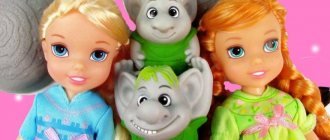Planning the lighting
An eco-style children's room can be illuminated with lamps made of glass, metal, wood, fabric, paper, rattan or a cascade of mother-of-pearl plates.
- If you really want to decorate the room with a bright plastic lamp, then choose a product made of polypropylene. Why from him? The fact is that this plastic can be recycled, it is harmless not only to human health, but also to the environment.
By the way, it is recommended to choose LED light bulbs - the most environmentally friendly light bulbs of all possible. They are safe to drop and break, they practically do not heat up, save energy and do not require special disposal. The worst choice may be fluorescent light bulbs, which contain mercury and therefore require special disposal and careful handling.
The best types of wood for ecological furniture
According to the hardness of the species, wood is:
- Soft: alder, birch, pine.
- Medium hardness: oak, cherry, beech.
- Hard: maple, merbau and others.
In addition to strength, timber must be moisture resistant. Hardwoods do not always tolerate moisture well. While soft varieties can calmly react to water. Because of this capricious behavior of wood, a new method of processing timber was developed. Using high temperatures (more than +200 °C), the saw cut is processed and hardened. Thus, the new thermowood hardens and becomes resistant to moisture.
Each tree species is unique. Some people value hardwood for its strength and durability, but furniture made from softwood also has its fans. What types of wood should I buy ecological children's furniture from? The ones that have proven themselves best in furniture production are:
- Walnut timber. Given their hardness, they are easy to work with. They are often used for carving. Walnut wood comes in a variety of colors. The most expensive type is black walnut; it is used in finishing unique pieces of furniture. This material has several dozen types of wood.
- Birch. A very popular raw material due to its availability. Birch groves are a symbol of our country. Karelian birch is especially popular. Its texture resembles marble and has a unique pattern. Paints and varnishes adhere well to birch products. They also adhere well and can be polished. Birch wood is often used to make veneer. The disadvantage of this material is fairly rapid deterioration by small insects and bacteria.
- Oak wood is used to make strong and durable furniture. It has a wide palette of colors: from light yellow to yellowish-brown. Despite its hardness, it bends, polishes, and drills quite easily. This material is easy to varnish and paint. Carving oak is difficult, but at the end you will get a real work of art. Oak is the most popular wood material. It withstands the destructive influence of microorganisms.
- Beech furniture is very strong and durable. At the same time, beech is very plastic. Bent furniture made from this wood is especially popular. Shades of this breed come in both yellow and reddish-brown. Beech is easy to work with: it sands, glues and polishes well.
- Larch furniture has a positive effect on human health. This material accumulates biologically active substances that help fight viruses and make it easier to endure colds. This role is taken on by phytoncides or natural antibiotics released from larch. The color palette of this breed is very rich and includes more than ten shades. Not only is furniture made from larch, but it is also used in finishing work.
- Pine has a special softness and light shade. This raw material is popular among cabinet furniture manufacturers. Bacteria, humidity, and temperature changes are not dangerous for pine trees. In addition, furniture made from this wood has a unique pine smell.
- Maple is rarely used for making furniture. Its wood is dense, strong and heavy. More often, this material is used as veneer when finishing luxury types of furniture. The most popular is Canadian maple. The veneer of this tree has a bright, unusual pattern.
How to choose ecological children's furniture
It is quite difficult to buy ecological children's furniture. Yes, there is now a huge selection available, but how can parents make the right choice? Before purchasing, consider which material is preferable for you. Be sure to request appropriate quality certificates from the manufacturer.
Furniture items in a children's room should be adapted to the child. The bed should be comfortable and appropriate for the baby's age. The table and chair should be chosen according to his height. The child should open all furniture doors and drawers without effort.
Do not buy upholstered furniture that uses foam rubber as a filler. And the upholstery should be made of natural fabric. Carefully inspect your future purchase. If a piece of furniture has a strong, chemical smell, do not buy it. It may be made of high-quality wood, but they clearly saved money on paint and varnish materials.
Furniture should be chosen that is reliable and easy to use. Opt for multifunctional furnishings. The longer you use them, the less often you will need to buy new ones. Accordingly, less trash will be thrown into the street.
The most environmentally friendly and safe material for children's furniture
Environmentally friendly furniture is made from solid wood. All additional fasteners, fittings, and paintwork must be as organic as possible, safe for children, and not release toxins. Today, various wood species are used in furniture production. They differ in their features of use, processing methods, general qualities, and structure.
Each consumer chooses wood for furniture to suit their taste. Everyone has their own requirements and preferences. The materials for the desk and shelving may differ from each other. Again, we will say that the main factor when choosing ecological children's furniture is the use of organic dyes and paints. Paints and enamels protect wood from humidity, high temperatures, and mechanical damage. It is better to give preference to water-based varnishes.
Reliable furniture made from natural wood will serve you for many years. It, of course, can also fail, but its service life is much longer than that of furniture made from chipboard.
Buyers of natural furniture consider their purchase as an investment. For them, a lovely baby crib, made as a one-piece piece from high-quality wood, is a work of art. Over time, its value will increase.
It is generally accepted that wood has medicinal properties. Each type of wood has a different effect on the human energy field. Oak, birch, and apple trees will charge you with their energy, but poplar and aspen, on the contrary, can take it away. Wood can restore strength and relieve aggressiveness. Cedar, for example, has disinfectant properties.
The pattern of each wood cut is unique. The color scheme radiates sunlight, it contains all shades of gold, because the tree constantly absorbs solar energy; even in winter frosts it remains warm. If you just look at wooden household items, you immediately get a feeling of peace and tranquility. Such furniture makes the house cozy and fills it with a special “living” atmosphere.
Since wood is an organic material, it does not pollute the environment. Wood combines reliability and safety. Due to these properties, timber is actively used in construction and furniture manufacturing.
Thus, wood is not just a consumable product, a raw material for construction, or a material for repairs. Trees and humans closely interact with each other in a single ecological system. Wooden things affect people's energy. Modern technologies have made great strides forward, but there is still no material that could fully replace wood/
Summary of educational activities for speech development in the middle group on the topic “Furniture”
Elena Grebenshchikova
Summary of educational activities for speech development in the middle group on the topic “Furniture”
GCD for speech development in the middle group on the topic " Furniture "
Correctional and educational goals. Clarification and expansion of ideas about furniture , its purpose, the parts of which it consists. Improving the grammatical structure of speech (understanding and using some simple prepositions, forms of nouns in the genitive case with the meaning of absence).
Corrective and developmental goals . Activation of children's speech activity. Development of physiological breathing, dialogic speech , visual perception and attention, articulatory, fine and gross motor skills.
Correctional and educational goals. Formation of cooperation skills, a positive attitude towards participation in classes, initiative and independence.





